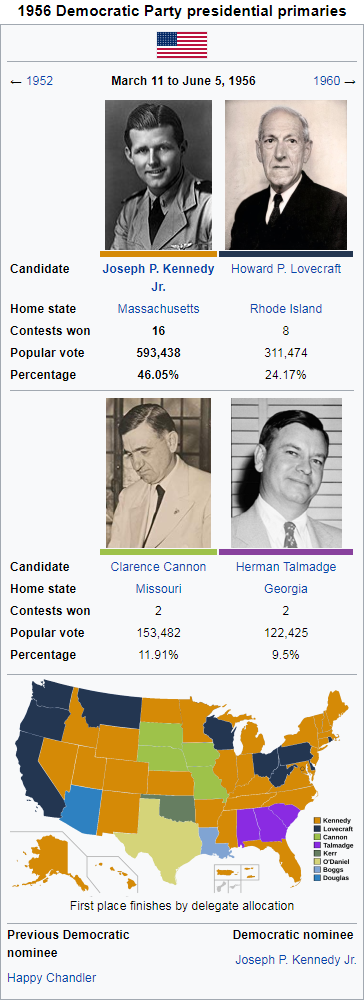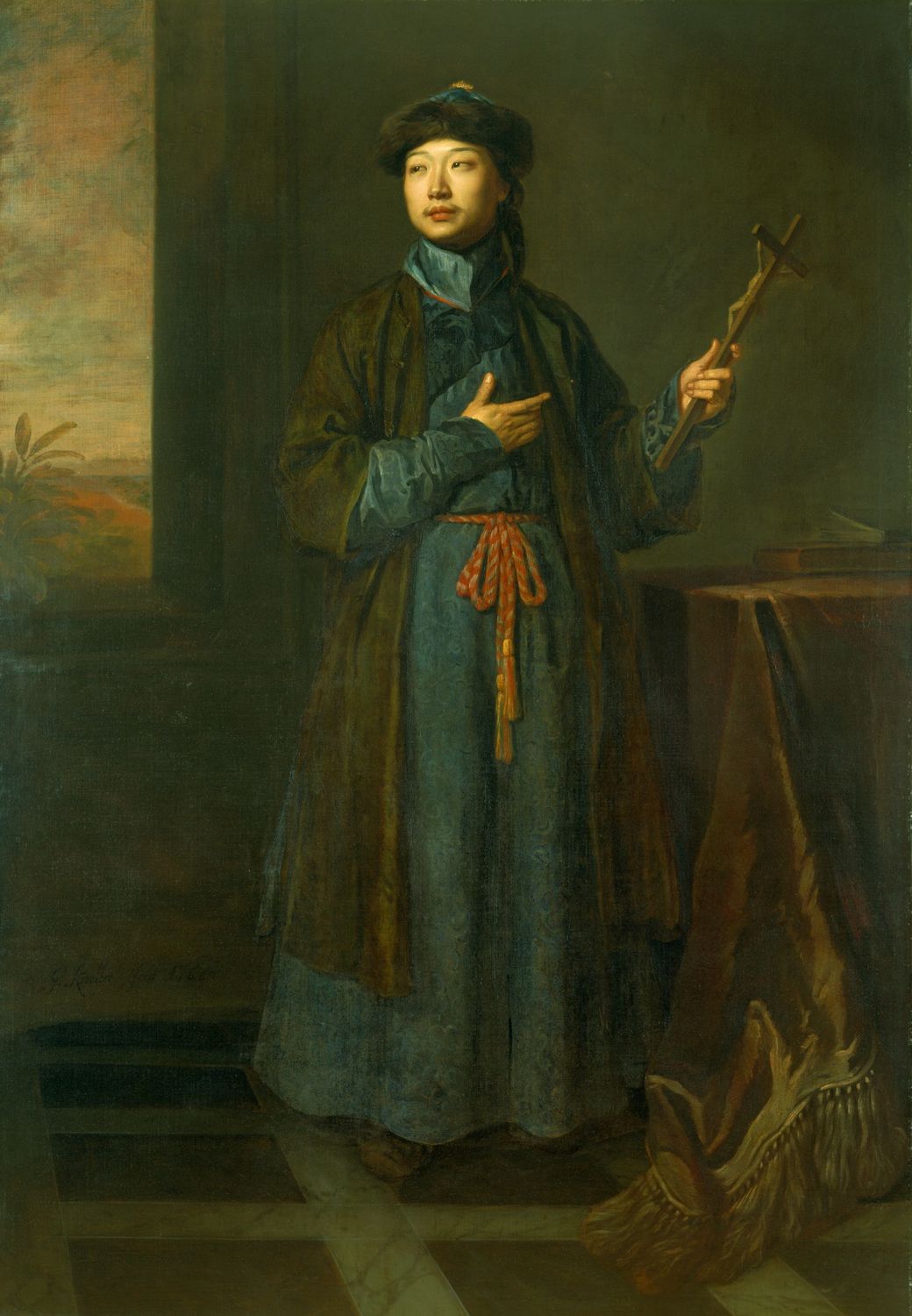Unyielding Roar
1929-1936: Herbert Hoover (CA)/Charles Curtis (KS) (Republican)
1928: def. Al Smith (NY)/Joseph T. Robinson (AR) (Democratic)
1932: def. J. Hamilton Lewis (IL)/John N. Garner (TX) (Democratic)
1936-1937: Herbert Hoover (CA)/vacant (Republican)
1937-1941: Alvan T. Fuller (MA)/B. Carroll Reece (TN) (Republican)
1936: def. Albert Ritchie (MD)/Paul V. McNutt (IN) (Democratic), William Langer (ND)/Thomas H. Benton (MO) [replacing Floyd B. Olson (MN)/William Langer (ND)] (Farmer-Labor)
1941-1949: Charles F. Hurley (MA)/Tom Connally (TX) (Democratic)
1940: def. Alvan T. Fuller (MA)/B. Carroll Reece (TN) (Republican), Thomas H. Benton (MO)/Homer T. Bone (WA) (Farmer-Labor)
1944: def. Lester J. Dickinson (IA)/Irving Ives (NY) (Republican), Culbert Olson (CA)/Homer T. Bone (WA) (Progressive-Farmer-Labor ~ United Coalition)
1949-1953: Edsel Ford (MI)/John A. Coolidge (CT) (Republican)
1948: def. James Allred (TX)/Harry Truman (MO) (Democratic)
1952: def. Happy Chandler (KY)/Lewis W. Douglas (AZ) (Democratic), Robert M. La Follette Jr. (WI)/Sheridan Downey (CA) (Progressive-Farmer-Labor ~ United Coalition)
1953-present: John A. Coolidge (CT)/vacant (Republican)

It is 1956, and the chief business of America is business, as it has always been. The center of global economy, the United States of America continues to keep the League of Nations at arm's length, putting itself and the Americas above global affairs. Although immigration remains limited, tourists and native-born Americans flock to megalopolises like New York, Boston and Chicago, seeking to visit the Cotton Clubs, take a look at the Better Babies contests and share in the taste of the Capone pie.
In this environment of bustling cities and growing wealth, the Republicans are the preferred pick of the vast majority of Americans, or at least the vast urban middle class, for whom the Party of Lincoln and Coolidge symbolizes normalcy, sovereignty and liberty. Farmers in the West have been... slightly less appreciative, but they do largely vote Republican. Beneath the parallel 36°30' north and in certain big cities the Democrats are dominant, backed by poll taxes, urban machines and century-long traditions; the Party of Jackson, divided chiefly between the Southerners and the non-WASP Northerners, has never really mustered strong opposition to Republican power, and even the 1929 slump (which proved to be little more than a hiccup) failed to see the Democrats take charge as was expected by some pundits - however, it did empower the Farmer-Labour Party and the Progressive Party, both of which would go on to form a coalition and prove fairly popular with Midwestern farmers and West Coast citizens, aggrieved by the laissez-faire policies of the Republican establishment.
Republicans didn't govern completely uninterrupted, however, as a series of scandals within to the Fuller administration, the 1939 "Plains scare" and the Japanese Empire's increasing aggression towards the Philippines and American business in China saw the Democrats, led by Massachusetts Governor Charles Hurley and Texas Senator Tom Connally, retake the White House.
Although Hurley tried to promote a slightly more "Wilsonian" agenda in terms of domestic and international policies, he frequently had to fight an unfriendly Congress, and much of his tenure was dominated by the Pacific War - which, while a defeat for the imperialistic Japanese, was painted by prominent American newspapers as yet another unnecessary international quagmire, and the Treaty of Rotterdam was perceived by certain figures as far too beneficial for the Brits, the Soviets and the "perfidious Orientals" which gained independence during the implementation of the Treaty.
In the end, though not unpopular, Hurley left the office lobbed with accusations of corruption and war profiteering, and a compromise ticket, well-meaning as it was, ended up losing to the Dynamic Duo of Edsel Ford and John Coolidge, the sons of the two very bastions of greatness that defined modern Americana. Continuing business as usual after a brief break from normalcy, Ford and Coolidge went on to win against the increasingly marginalized Democrats in 1952. President Ford's unfortunate passing from stomach cancer was mourned by the entire country, and led Congressional Democrats to take a beating during the midterms. With the younger Coolidge at the helm, the ship of state remains at peace, though as controversies regarding Coolidge's governorship of Connecticut and administration of the New Haven railroad system emerge, few can imagine what the future holds for America.
1929-1936: Herbert Hoover (CA)/Charles Curtis (KS) (Republican)
1928: def. Al Smith (NY)/Joseph T. Robinson (AR) (Democratic)
1932: def. J. Hamilton Lewis (IL)/John N. Garner (TX) (Democratic)
1936-1937: Herbert Hoover (CA)/vacant (Republican)
1937-1941: Alvan T. Fuller (MA)/B. Carroll Reece (TN) (Republican)
1936: def. Albert Ritchie (MD)/Paul V. McNutt (IN) (Democratic), William Langer (ND)/Thomas H. Benton (MO) [replacing Floyd B. Olson (MN)/William Langer (ND)] (Farmer-Labor)
1941-1949: Charles F. Hurley (MA)/Tom Connally (TX) (Democratic)
1940: def. Alvan T. Fuller (MA)/B. Carroll Reece (TN) (Republican), Thomas H. Benton (MO)/Homer T. Bone (WA) (Farmer-Labor)
1944: def. Lester J. Dickinson (IA)/Irving Ives (NY) (Republican), Culbert Olson (CA)/Homer T. Bone (WA) (Progressive-Farmer-Labor ~ United Coalition)
1949-1953: Edsel Ford (MI)/John A. Coolidge (CT) (Republican)
1948: def. James Allred (TX)/Harry Truman (MO) (Democratic)
1952: def. Happy Chandler (KY)/Lewis W. Douglas (AZ) (Democratic), Robert M. La Follette Jr. (WI)/Sheridan Downey (CA) (Progressive-Farmer-Labor ~ United Coalition)
1953-present: John A. Coolidge (CT)/vacant (Republican)

It is 1956, and the chief business of America is business, as it has always been. The center of global economy, the United States of America continues to keep the League of Nations at arm's length, putting itself and the Americas above global affairs. Although immigration remains limited, tourists and native-born Americans flock to megalopolises like New York, Boston and Chicago, seeking to visit the Cotton Clubs, take a look at the Better Babies contests and share in the taste of the Capone pie.
In this environment of bustling cities and growing wealth, the Republicans are the preferred pick of the vast majority of Americans, or at least the vast urban middle class, for whom the Party of Lincoln and Coolidge symbolizes normalcy, sovereignty and liberty. Farmers in the West have been... slightly less appreciative, but they do largely vote Republican. Beneath the parallel 36°30' north and in certain big cities the Democrats are dominant, backed by poll taxes, urban machines and century-long traditions; the Party of Jackson, divided chiefly between the Southerners and the non-WASP Northerners, has never really mustered strong opposition to Republican power, and even the 1929 slump (which proved to be little more than a hiccup) failed to see the Democrats take charge as was expected by some pundits - however, it did empower the Farmer-Labour Party and the Progressive Party, both of which would go on to form a coalition and prove fairly popular with Midwestern farmers and West Coast citizens, aggrieved by the laissez-faire policies of the Republican establishment.
Republicans didn't govern completely uninterrupted, however, as a series of scandals within to the Fuller administration, the 1939 "Plains scare" and the Japanese Empire's increasing aggression towards the Philippines and American business in China saw the Democrats, led by Massachusetts Governor Charles Hurley and Texas Senator Tom Connally, retake the White House.
Although Hurley tried to promote a slightly more "Wilsonian" agenda in terms of domestic and international policies, he frequently had to fight an unfriendly Congress, and much of his tenure was dominated by the Pacific War - which, while a defeat for the imperialistic Japanese, was painted by prominent American newspapers as yet another unnecessary international quagmire, and the Treaty of Rotterdam was perceived by certain figures as far too beneficial for the Brits, the Soviets and the "perfidious Orientals" which gained independence during the implementation of the Treaty.
In the end, though not unpopular, Hurley left the office lobbed with accusations of corruption and war profiteering, and a compromise ticket, well-meaning as it was, ended up losing to the Dynamic Duo of Edsel Ford and John Coolidge, the sons of the two very bastions of greatness that defined modern Americana. Continuing business as usual after a brief break from normalcy, Ford and Coolidge went on to win against the increasingly marginalized Democrats in 1952. President Ford's unfortunate passing from stomach cancer was mourned by the entire country, and led Congressional Democrats to take a beating during the midterms. With the younger Coolidge at the helm, the ship of state remains at peace, though as controversies regarding Coolidge's governorship of Connecticut and administration of the New Haven railroad system emerge, few can imagine what the future holds for America.
Last edited:




